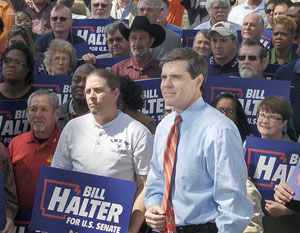A campaign finance reform bill meant to curb the excesses of the Citizens United decision is scheduled for a vote in the House today. The Supreme Court ruling lifted spending restrictions for unions and corporations, allowing them to spend freely on campaign ads that explicitly advocated for or against candidates. The DISCLOSE Act is intended to help level the playing field by requiring all groups to reveal the donors behind such ads, preventing corporations from hiding behind third parties—as they’ve often done in the past—to avoid having to reveal their identities.
The argument is that such measures could have a cooling effect on unfettered corporate spending on elections, as companies might be reluctant to risk tainting their brands by supporting or opposing a candidate. I suspect that this might be true: in the months since the Citizens United decision, there have been very few reports of corporations taking advantage of the ruling by directly funding campaign ads themselves.
But the bill set off a firestorm last week after the National Rifle Association scored a big carveout for itself that would exempt it from the legislation’s disclosure rules—most importantly, it wouldn’t have to reveal its closely held list of donors. This bout of political horsetrading caused both conservative and liberal advocates to cry foul, and the measure’s chances of passage—in either the House or the Senate—are now uncertain.
David Broder suggests an alternative reform proposal today (found via Ezra’s Wonkbook) that would forgo disclosure requirements in favor of empowering small donors, citing an idea promoted by Michael Malbin, head of the nonpartisan Campaign Finance Institute:
Malbin’s model is the New York City system, with a 6-to-1 match for the first $175 of any contribution, making it worth $1,225 to the candidate.
With that kind of payoff, he says, candidates would have every reason to go after small contributors—and pay less attention to the fat cats. And with a flood of such “clean” money, the dollars that corporations and unions decide to spend in the game would become relatively less important.
It’s an interesting idea—and could certainly be an incentive for candidates to seek out small donors, even if they don’t have that same Obama magic. But while it does make small donors more competitive, it wouldn’t eliminate the need for the disclosure requirements in the current bill. And New York City itself is a good example of why.
NYC’s campaign finance rules certainly haven’t deterred Mayor Michael Bloomberg, the eighth richest person in the US, from forgoing public financing so he could dip into his billions without restriction to back his campaigns. But at least the public is quite aware that his own corporate fortune has backed his bid—and Bloomberg’s rightfully had to weather the criticism that comes along with it. Similarly, if corporations want to underwrite federal campaign expenditures, they should at least be required to do so in public view. As it stands, we have no way of knowing whether Citizens United has yet unleashed a wave of corporate election spending, as deep-pocketed groups are still allowed to hide behind third parties who can do their bidding.















